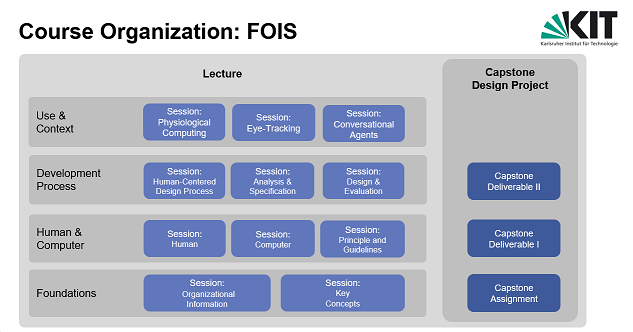Foundations of Interactive Systems
- Type: Vorlesung (V)
- Semester: SS 2020
-
Time:
2020-04-21
11:30 - 13:00 wöchentlich
10.21 Carl-Benz-Hörsaal
10.21 Hörsaalgebäude
2020-04-28
11:30 - 13:00 wöchentlich
10.21 Carl-Benz-Hörsaal
10.21 Hörsaalgebäude
2020-05-05
11:30 - 13:00 wöchentlich
10.21 Carl-Benz-Hörsaal
10.21 Hörsaalgebäude
2020-05-12
11:30 - 13:00 wöchentlich
10.21 Carl-Benz-Hörsaal
10.21 Hörsaalgebäude
2020-05-19
11:30 - 13:00 wöchentlich
10.21 Carl-Benz-Hörsaal
10.21 Hörsaalgebäude
2020-05-26
11:30 - 13:00 wöchentlich
10.21 Carl-Benz-Hörsaal
10.21 Hörsaalgebäude
2020-06-02
11:30 - 13:00 wöchentlich
10.21 Carl-Benz-Hörsaal
10.21 Hörsaalgebäude
2020-06-09
11:30 - 13:00 wöchentlich
10.21 Carl-Benz-Hörsaal
10.21 Hörsaalgebäude
2020-06-16
11:30 - 13:00 wöchentlich
10.21 Carl-Benz-Hörsaal
10.21 Hörsaalgebäude
2020-06-23
11:30 - 13:00 wöchentlich
10.21 Carl-Benz-Hörsaal
10.21 Hörsaalgebäude
2020-06-30
11:30 - 13:00 wöchentlich
10.21 Carl-Benz-Hörsaal
10.21 Hörsaalgebäude
2020-07-07
11:30 - 13:00 wöchentlich
10.21 Carl-Benz-Hörsaal
10.21 Hörsaalgebäude
2020-07-14
11:30 - 13:00 wöchentlich
10.21 Carl-Benz-Hörsaal
10.21 Hörsaalgebäude
2020-07-21
11:30 - 13:00 wöchentlich
10.21 Carl-Benz-Hörsaal
10.21 Hörsaalgebäude
- Lecturer:
- SWS: 3
- Lv-No.: 2540560
+++ Aktuelle Situation +++
Die Vorlesung Foundations of Interactive Systems findet trotz der aktuell durch COVID-19 verursachten Einschränkungen statt. Die ersten vier Veranstaltungen (ggf. mehr folgend) werden online über ILIAS zur Verfügung gestellt. Zudem besteht die Möglichkeit fachliche und organisatorische Fragen jederzeit über das entsprechende Ilias Forum zu artikulieren.
Description
Computers have evolved from batch processors towards highly interactive systems. This offers new possibilities but also challenges for the successful design of the interaction between human and computer. Interactive system are socio-technical systems in which users perform tasks by interacting with technology in a specific context in order to achieve specified goals and outcomes.
This lecture introduces key concepts and principles of interactive systems from a human and computer perspective. Furthermore, it describes core development processes for interactive systems as well as provides insights on the use & contexts of interactive systems with a specific focus on selected application areas in organizations and society. With this lecture, students acquire foundational knowledge to successfully design of the interaction between human and computers in business and private life.
The course is complemented with a design capstone project, where students in a team apply design methods & techniques in order to create an interactive prototype
Learning Objectives
The students
- have a basic understanding of key conceptual and theoretical foundations of interactive systems from a human and computer perspective
- are aware of important design principles for the design of important classes of interactive systems
- know design processes and techniques for developing interactive systems
- know how to apply the knowledge and skills gathered in the lecture for a real-world problem (as part of design-oriented capstone project)
Prerequisites
No specific prerequisites are required for the lecture
Grading
The course has two grading components: Exam (60%) and Capstone Project (40%). First, there will be a 60 minutes closed-book / closed-notes exam consisting of short-answer, multiple-choice and analytical questions covering lecture material and business talks. Second, teams work in a capstone project and design an interactive system. Each team has deliver a paper (max 10 pages) which presents the activities carried out in the human-centered design project and the resulting prototype. Both grading components need to be passed (grade 4.0 or better). A fail in either the exam or the capstone project results in a fail of the entire course. There is no retake possibility for the capstone project. Thus, if you fail the capstone project, you need to retake the entire course in the upcoming year.
Registration and Organization
Please register via the learning platform ILIAS to the course. For specific dates and location of the lecture, please check the Website or portal. All questions regarding content, organization, and certificates are answered by the responsible single point of contact for the lecture as documented on the research group Website.
Literature
Alan Dix, Janet E. Finlay, Gregory D. Abowd, and Russell Beale. 2003. Human-Computer Interaction (3rd Edition). Prentice-Hall, Inc., USA.
Helen Sharp, Yvonne Rogers, and Jenny Preece. 2017 (4th edition). Interaction Design: Beyond Human Computer Interaction. John Wiley & Sons, Inc., Hoboken, NJ, USA.
Further literature will be made available in the lecture.
Course Outline
Contact: Nico Loewe (nico.loewe@kit.edu)


